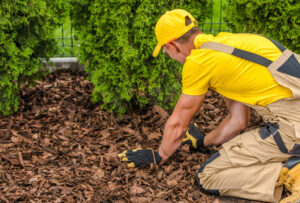Most people probably don’t pay much attention to the landscaping as they walk in or out of a business. But when you’re responsible for that landscaping—either because your business owns its property and manages its own landscaping, or because your business provides property maintenance services—you always notice when plants need to be yanked out or trees need to come down. At this time of year, workers have to start pruning, pulling out plants and clearing out debris to prepare garden beds and other landscaped areas for winter. So it’s a natural time to make sure your business is handling landscaping disposal in an efficient, sustainable and legal way. Like other kinds of hard-to-manage waste, landscaping scrap requires special treatment.
For Massachusetts businesses, proper landscaping disposal is a matter of law.
 MassDEP’s commercial organics ban was first enacted in 2014 and applied to any entity that generated at least one ton of organic waste per week. In 2021, MassDEP issued its 2030 Solid Waste Master Plan, with the goal of reducing waste disposal across Massachusetts by 30 percent. One of the steps MassDEP announced it was taking to divert more waste from landfills was to lower the threshold for the organics ban, making many existing Massachusetts businesses subject to its restrictions for the first time.
MassDEP’s commercial organics ban was first enacted in 2014 and applied to any entity that generated at least one ton of organic waste per week. In 2021, MassDEP issued its 2030 Solid Waste Master Plan, with the goal of reducing waste disposal across Massachusetts by 30 percent. One of the steps MassDEP announced it was taking to divert more waste from landfills was to lower the threshold for the organics ban, making many existing Massachusetts businesses subject to its restrictions for the first time.
Now, any commercial entity that generates more than one-half ton of organic waste per week is prohibited from throwing it away. These businesses must use composting, conversion, recycling or reuse to manage organic waste. The ban largely affects businesses that produce or sell food. However, vegetative material (such as plant trimmings and other organic landscaping waste) is also covered by the ban.
What does the organics waste ban mean for businesses that manage landscaping?
There are basically two groups of businesses that are directly affected by the organics waste ban as it relates to landscaping waste. First, businesses that provide landscaping and/or property maintenance services for commercial properties. Second, businesses that own their own properties and either pay a landscaping service to do maintenance, or perform their own maintenance. Both types of businesses should do everything they can to maintain compliance with the waste ban, whether they hire someone else to haul away their organic landscaping waste or handle landscaping disposal directly.
It’s important to note that a business doesn’t need to generate half a ton of organic waste every week to trigger the ban. It applies during any week in which that much organic waste is generated. Let’s say your business owns its own property. Your landscaping service typically visits once a week to mow and prune trees as needed. Theoretically, they could throw a small amount of cut tree branches in your dumpster without violating the waste ban. Then you have your landscaping service make a special visit to pull out a bunch of plants and trim several trees in preparation for the winter and they remove at least half a ton of waste. You would automatically be covered by the ban for that week and would need to ensure that whoever was hauling away your waste was prepared to dispose of it correctly rather than just dumping it somewhere.
What can be done with organic materials collected for landscaping disposal?
In Massachusetts, landfills are prohibited from accepting organic waste like yard clippings as trash, unless it’s contaminated waste. (Non-organic landscaping waste such as stones may still be hauled to a landfill for disposal.)
Composting is often the easiest and most efficient way to dispose of plants and other organic landscaping waste. Municipalities run collection sites that accept yard waste from residents, but commercial businesses are often excluded. However, there are several composting collectives within Massachusetts that accept yard waste for composting, as well as facilities that are working on using anaerobic digestion to convert organic waste into energy. Ultimately the best way to find local resources for your landscaping disposal needs is to contact your waste management provider for specific guidance.
How is the landscaping disposal ban enforced?
MassDEP has always been cagey about specific fines and other penalties for violators of the organics waste ban. The department notes that it holds all parties responsible for compliance, from the businesses that generate organic waste to the solid waste facilities that manage it. Inspections may be performed at these facilities to ensure compliance and MassDEP says that it will “pursue enforcement actions” against violators, but doesn’t share how much a business may be fined for violating the ban.
Considering the ambitious goals set by the 2030 plan, it’s possible MassDEP will crack down on enforcement in the coming years and start issuing penalties. Businesses that create responsible landscaping disposal plans now shouldn’t have to worry about fines later on.
Contact Miller Recycling for Help with Hard to Manage Waste
Miller Recycling doesn’t specialize in landscaping disposal services or other kinds of organic waste disposal, but we can assist businesses that need this kind of support in a few ways, from supplying containers for collecting landscaping waste to making recommendations about landscaping disposal solutions. We can also do a site visit to assess your current recycling processes and make suggestions to help your business manage all of its waste efficiently, while maintaining compliance with Massachusetts disposal laws. I always welcome your questions, so feel free to contact me today!

